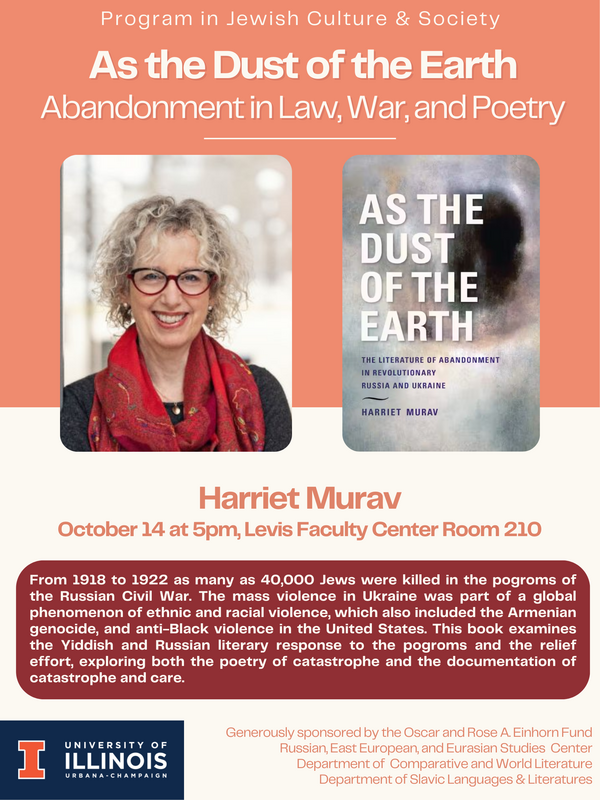
Harriet Murav, "As the Dust of the Earth: Abandonment in Law, War, and Poetry"
- Event Type
- Lecture
- Sponsor
- Program in Jewish Culture & Society; Oscar and Rose A. Einhorn Fund; Russian, East European, and Eurasian Center; Department of Comparative and World Literature; Department of Slavic Languages & Literatures
- Location
- 210 Levis Faculty Center (919 W. Illinois St., Urbana, IL 61801)
- Date
- Oct 14, 2024 5:00 pm
- Speaker
- Harriet Murav (Catherine and Bruce Bastian Professor of Global and Transnational Studies, University of Illinois)
- Cost
- Free and open to the public.
- Contact
- Eugene Avrutin
- eavrutin@illinois.edu
- Views
- 136
- Originating Calendar
- Russian, E. European & Eurasian Center: Co-sponsored Events
From 1918 to 1922 as many as 40,000 Jews were killed in the pogroms of the Russian Civil War. The mass violence in Ukraine was part of a global phenomenon of ethnic and racial violence, which also included the Armenian genocide, and anti-Black violence in the United States. This book examines the Yiddish and Russian literary response to the pogroms and the relief effort, exploring both the poetry of catastrophe and the documentation of catastrophe and care.
Harriet Murav, a literary scholar, is the Catherine and Bruce Bastian professor of Global and Transnational Studies, with a joint appointment in the Department of Slavic Languages and Literatures and Comparative and World Literature. Her research focuses on Russian and Yiddish literature. She is the author of Holy Foolishness: Dostoevsky's Novels & the Poetics of Cultural Critique (1992), Russia's Legal Fictions (1998); Identity Theft: The Jew in Imperial Russia and the Case of Avraam Uri Kovner (2003); Music From a Speeding Train: Jewish Literature in Post-Revolution Russia (2011), and David Bergelson’s Strange New World: Untimeliness and Futurity (2019). She is the co-translator, with Sasha Senderovich, of David Bergelson’s Judgment (2017), and with Sholem Berger, of a trio of poems by the Yiddish poet Leyb Kvitko. As the Dust of the Earth: The Literature of Abandonment in Revolutionary Russia and Ukraine is her most recent book, published by Indiana University Press in April 2024.